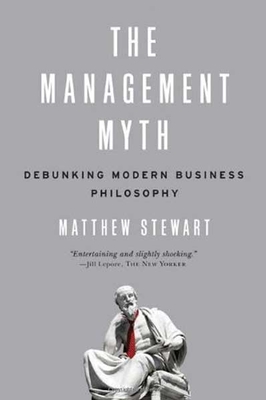 The Management Myth: Why the Experts Keep Getting it Wrong by Matthew Stewart (WW Norton)
The Management Myth: Why the Experts Keep Getting it Wrong by Matthew Stewart (WW Norton)
As the title suggests, Matthew Stewart’s The Management Myth posits that the modern cult of management, with its attendant consultants and schools and MBAs and gurus and shelves of self-improvement books, is a monumental, gleaming crock in which staggering quantities of cash are steamed in the vapour of highly refined snake oil. This is not an original or unusual opinion. It is a view, indeed, that will already be held by most sane persons, and it doubtless causes significant distress to those taxpayers aware that among those most insatiably hungry for such tripe are the governments of the allegedly enlightened world, who pay for it with our money.
What makes Stewart’s indictment of the phenomenon more interesting, more convincing – and more enraging – than most is that he was himself once a management consultant, one of the half million such creatures now estimated to be at large in the world, and made a sizeable stack in the process (he is now a writer and philosopher, which may be no more useful, but is at least underwritten by people who choose to do so).
The Management Myth is essentially two books, presented in alternating chapters. One book is a lively, breezily written history of the theory and practice of management consultancy, peopled by such fabulous charlatans and outright loons as Frederick Taylor, author of the absurd book (1911’s The Principles Of Scientific Management) that founded the rickety Potemkin edifice of modern management consultancy, and Elton Mayo, a ridiculous Australian huckster who somehow talked his way into 20 years of tenure at the Harvard Business School (a fact that, a long time ago though it was, tells us much about what may well be the single most over-rated institution of our times). The other book is a wry, self-deprecating memoir of Stewart’s own time dispensing the hogwash patented by his abovementioned forebears.
Stewart is a naturally entertaining writer with an eye for the comic detail and an enviable gift for deadpan, and both these yarns would read like rich, ripe satire if they weren’t true.
Somewhere at the eye of the hurricane of nonsense described by Stewart, there’s a zephyr of good, humble sense. We can all benefit, at times, whether personally or professionally, from an outsider’s counsel – someone who can help us distinguish wood from trees, wheat from chaff, leaden cliché from original thought. It is important, however, that whichever sage we retain has a reasonably firm grip upon what they’re talking about. Modern management, as revealed by Stewart, is an arena in which clueless, spotty whelps who’ve barely grown into their first pair of red braces are paid fortunes to decide the futures of immense and venerable corporations and governments – by the very people who are already being remunerated handsomely to run them. “I never lost the sensation,” admits Stewart early on, “that I was just making it all up as I went along.”

